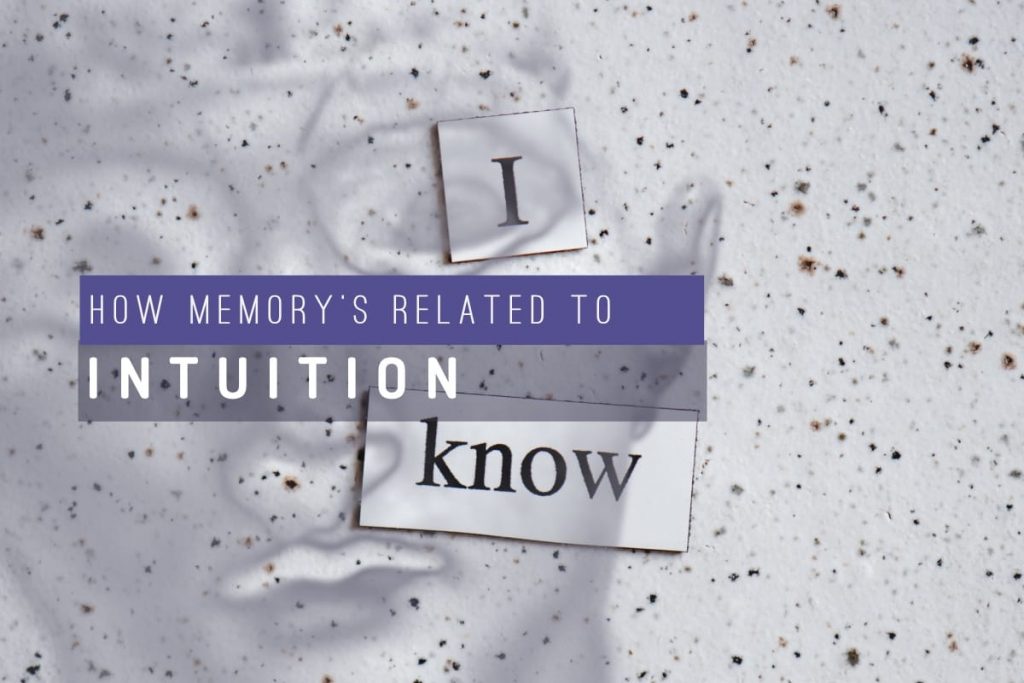Science tells us that our memories help us to ‘connect the dots’ in intuition-based decision-making. But if intuition feels like more of a spark of knowing without knowing why, or with having memories, then how or why is memory related to intuition? Let’s have a look.

intuition in decision making and memory
The scientific literature describes various means of intuition, including problem-focused, creative, social, and moral types in the field of psychology. 1 Is memory involved in these?
Understanding the process of intuition is complex and multidimensional. 1 See instinct vs intuition.
You might consider problem-focused as the main determinant in decision-making but business and management researchers refer to an ‘entrepreneurial intuition’, which apparently draws on all four types of intuition mentioned above.1
Entrepreneurs often express their reliance on intuition for several types of decisions while labelling its source somewhere hidden in a black box of our mind.
S. Nandram in Philosophy of Management (2016)
Still, Gore and Sadler-Smith’s work in unpacking intuition identifies problem-solving intuition, which includes matching patterns with “prototypes and scripts held in long-term memory”, as the only type related to memory. 1
In many accounts, the decision-making that involves intuition is considered spontaneous and affect-based.2 Whereas, the alternative: deliberate decision-making, infers effort, planning and analyses. 2
What science says about memory and intuition
How it works is that our brain catalogues every diverse experience (sights, sounds, interactions) in our memory. Intuition draws from that source to inform our decision making.
Not all memory relates with intuition the same
In a 2006 study, Frank and other researchers3 tested the effect of impairing explicit memory on the decision making of healthy participants (23 of them).
They used Midazolam, a common drug used in medical procedures that works on the hippocampus in such a way that it induces temporary amnesia.
Note that the hippocampus is considered the site of the brain associated with the primary memory processes.
What’s this explicit memory? It’s the one we’re conscious of using, for example, when we intentionally learn or recall information for exams or simply when we note the price, size, or colour of products we intend to buy.
Compare this with implicit memory, which are experiences we record and recall unaware, as discovered from the study of subjects during temporary amnesia.
Researchers of the 2006 study concluded that intuition works to guide choices, and more so when explicit (conscious intentional) memory was restricted.3
It seems our implicit memory plays a key role in intuition (the problem-solving type, at least).
Perhaps this accounts for why those sensitive to their surroundings are more highly intuitive in that they sense and absorb more of what’s around them, unaware, and draw on this source as intuition (my thoughts).
Summing up Memory and intuitive decision making
There are two modes of decision-making characterised by psychologists: intuitive and deliberate.
Research indicates that implicit memory, which involves the unconscious storing and recall of experiences is related to intuition in decision-making. Could this be the case? What I know is how intuition feels to me. I’m not conscious of it being a memory.
References
- Gore, J., & Sadler-Smith, E. (2011). Unpacking Intuition: A Process and Outcome Framework. Review of General Psychology, 15, 304 – 316.
- Pachur, Thorsten, Spaar, Melanie. (2015).
Domain-specific preferences for intuition and deliberation in decision making. Journal of Applied Research in Memory and Cognition. 4(3), 303-311.
- Frank, M. J., O’Reilly, R. C., & Curran, T. (2006). When Memory Fails, Intuition Reigns: Midazolam Enhances Implicit Inference in Humans. Psychological Science, 17(8), 700–707.



